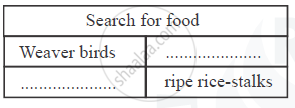Advertisements
Advertisements
Question
'Whose roots lay deeper than our lives' – what aspect of human behaviour does this line reflect?
Solution
A banyan tree's life cycle is a unique one, it grows as an epiphyte. It may live for more than 200 years or even 400-450 years. In contrast, average human life is of 70-80 years. It is clearly visible that one banyan alone may survive generations of humans. Banyan has strangled roots knotted in its trunk that grow for centuries. It transcends human life and rolls and grows with the knowledge that it witnesses all the while. The poet has subtly juxtaposed a human life to that of a banyan. For all its mythical hugeness that makes it an enigma a human is thrown into utter bewilderment and surprise for all the knowledge that it secrets away inside its vast trunk, which grows with its aerial roots that grow to reach the ground. They resemble the lives that it has lived again and again witnessing all the human lives that descended and perished with time standing tall and erect.
APPEARS IN
RELATED QUESTIONS
Complete the following table :

Which language do you use to talk to elderly relatives in your family?
Notice these expression in the text. Infer their meaning from the context.
billowed
This play, written in the 1950s, is a humorous and satirical depiction of the status of the mother in the family.
Do you think it caricatures these issues or do you think that the problems it raises are genuine? How does the play resolve the issues? Do you agree with the resolution?
The lecture was delivered in 1864. What are the shifts in style and diction that make the language different from the way it is used today?
Name the world-famous personality who reached great heights despite of humble circumstances.

Correct the following statement.
The last leaf was a real leaf that survived.
‘Dull would he be of soul who could pass by.’
This line of the poem can be rewritten as:
'He would be of a dull soul.'
The figure of speech is known as ‘Inversion’.
Find out one more example of Inversion from the poem.
Explain the following statement with reference to the context.
Because your father can't do without my help.
Read the story and write about the following in short.
Yonamine Chiru of Okinawa
Draw word webs for the following. Begin with the given word and go on writing as many other words associated with it, as you can. Use these words to write other related words to form a word web.

Who is the speaker in this poem?
An announcement can be made in every class, orally. Or, it can be put up on the school notice-board. Discuss and decide what method should be used for the announcement given here.
Oral aanouncement
Write other meaningful words that begin/end with anywhere.
Discuss how you will measure the worth of a sports event.
Tell any one of the stories orally imagining you are Gulliver.
Identify the speaker/character.
‘Come in, Zigzag, come in dear!’
What do you infer about speaking with others from this poem?
Give a picturesque view through which the train travels.
Work in pairs and answer the following.
Pick out the rhyming words.
Read the lines and answer the questions given below.
Autumn is English
in red, yellow and brown
Autumn is Indian
Whenever leaves fell down
- How is autumn in India?
- Compare the English autumn with the Indian autumn.
Our planet is called the _____.
How do the wheels go?
Look at the picture and Choose the correct word.

Where was the old man sleeping?
Choose the correct option from the given homophones.
I saw a ______ on the flower.
The old man was carrying _____.
The king gave______ seeds.
The merchant paid______ to the boatman.
What subject did he like the most?
